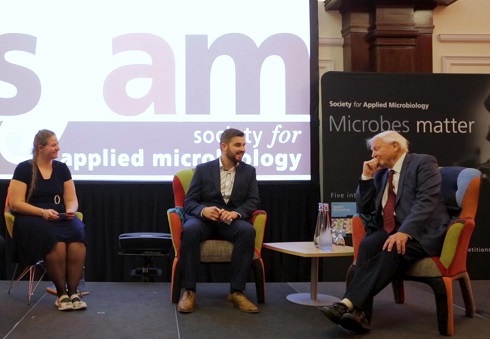“Sir David Attenborough is my hero and the reason I studied Marine Science and he was guest of honour at an event I was part of.”
After graduating with a Marine Biology degree from Ulster University, Alli did a Master’s degree in Research. While completing her Doctorate she joined the Early Career Scientist (ECS) Committee of the Society for Applied Microbiology (SfAM).
“When I joined the Society in 2015, I never dreamed that one day I’d be asked to represent the Society to interview Sir David Attenborough,” she says.
In recognition of his role raising the profile of the importance of microorganisms in the environment, as well as his invaluable contribution towards highlighting the urgent need to protect our oceans, the Society presented Sir David Attenborough with a Fellowship Award.
Alli continues: “The Award was presented at a Q & A event in London and I was invited to co-host it. Although I really wanted to do it, every part of me screamed, ‘no I can’t do that’ but, with some gentle persuasion and a lot of encouragement, I decided to accept the challenge.
In advance of the event, SfAM members submitted questions and Alli and her ECS colleagues had the nerve wracking job of pitching the questions to the guest of honour, Sir David Attenborough.
Alli continues: “Animal Management students at the College’s Ballymoney campus helped by providing several questions. This calmed my nerves further as it meant the challenge wasn’t just about me, it was also about representing these amazing young people.”
She asked two questions, both of which were set by students studying Animal Management at the College’s Ballymoney campus but Alli admits to being so nervous at being on a stage with her hero that she didn’t even realise he’d shaken her hand until the event was underway.
Her first question ‘have you ever been attacked by one of the animals you were filming? was set by Tasha Adams and Nicole Hargy. The second question, ‘What is the longest time you have taken to capture an animal on film?’ which was set by Ellie Termonia.
“When it came to my turn to ask a question, I felt as if my heart was going to burst out of my chest but once the first question successfully left my lips, I relaxed and was able to enjoy the master of storytelling spin his magic.
“Sir David’s kind demeanour helped relieve any anxiety and it was impossible not to be mesmerised by his stories. It’s much easier to be oblivious to the audience, co-hosts and cameras when you’re being charmed and entertained,” she admits.
In response to the first question about being attacked by an animal, Sir David replied:
“Animals don’t want to attack you. If you are silly enough not to take a warning sign and if you are stupid enough to stand on a snake, then yes, it it’s your fault for being a dimwit.”
He pointed out the relative safety of working with wildlife, compared to the foibles of humanity.
“The only time I’ve really feared for my life was when I was faced with a man. And a gun. And he’d had a few drinks.”
Sir David Attenborough may never have been attacked by an animal but unfortunately that was not been Alli’s experience of close encounters with wildlife, she reflects.
“I’ve had hamsters and crayfish dangling from my fingers – all in the name of research. I even got bitten by a Labrador when I was doing a paper round. But it seems that even the animals know Sir David’s a legend and can detect his respect for them and their environment.”
His candid response to the second question about how long it took to capture an animal on film, gave an insight into how the outstanding footage in wildlife documentaries is captured.
“It only takes (me) about 10 minutes,” he said, adding that because he doesn’t actually do the camerawork anymore, he doesn’t have to wait.
Sir David continued “But this is the terrible injustice of what I do as there could be thirty cameramen working on the series.”
He admitted that although he doesn’t use the camera at all now, he had neither the patience nor the skills of the specialist camera crews working on his documentaries.
“There was a time when snow leopards had never ever been filmed and one of my good friends, Dougy Adams, who is a marvellous cameraman with the patience of Job, was dispatched to the Himalayas where there were known to be snow leopards. He worked there for about three months and never saw even one. Nowadays, it’s different though because the animals can be electronically tagged so they are easier to track.”
After the Q & A session, Alli was asked to introduce two young members of the audience Dylan (9) and Ben (5) to her hero.
“It was a delight to see a man of 92 adjust his attention from talking to adults to talking to children. The joy on their faces as they met the legend of the natural world will be a lasting memory for me. And I now have a signed copy of ‘Life on Earth’, my most prized possession and a family heirloom!”
She adds: “Sir David Attenborough inspired my PhD research. I dreamed of being immersed in the animal world and observing their behaviour. Unfortunately, this was not my research experience and I spent much of my time murdering sponges to extract their bacteria! But he is still my hero”
The two year Level 3 Diploma in Animal Management is offered by Northern Regional College at both Ballymoney and Newtownabbey campuses. For further information go to www.nrc.ac.uk

